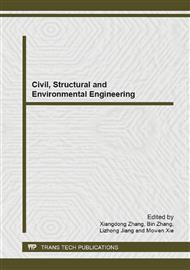p.1048
p.1054
p.1058
p.1063
p.1069
p.1073
p.1082
p.1087
p.1092
Durability Assessment of Reinforced Concrete Bridge Based on Fuzzy Neural Networks
Abstract:
In the operation process of bridge structures, some bridges appear early failure without reaching design reference period due to the influences of external environment, vehicle load and other factors. Therefore, the problem of structure durability is very obvious. In this paper, a new durability assessment method is proposed based on fuzzy neural networks, which can take account of the defects and deficiencies of existing durability assessment methods. The simulation for learning and testing samples indicates that the proposed method possesses good learning ability and predictive analysis ability. Actual project verifies the effectiveness of the method
Info:
Periodical:
Pages:
1069-1072
Citation:
Online since:
November 2013
Authors:
Price:
Сopyright:
© 2014 Trans Tech Publications Ltd. All Rights Reserved
Share:
Citation:


